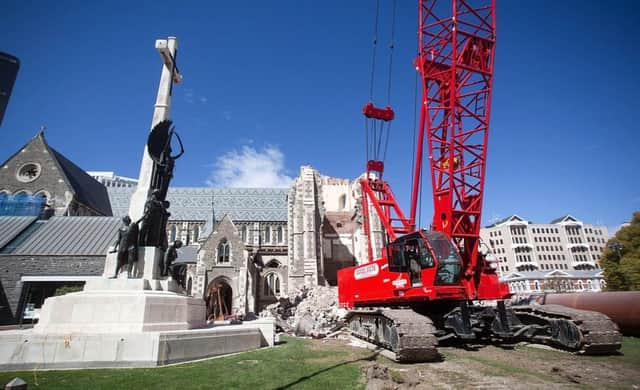Seismic change in mediator’s role


I began this piece in Christchurch, New Zealand. Nothing quite prepares you for seeing a first world city that looks in parts like a Third World town. Although the two earthquakes which devastated the city centre occurred nearly five years ago, it is still a shock to see major buildings such as the two cathedrals half standing and ruined, multi-storey blocks abandoned and fragmented, and businesses operating from container boxes. Many people remain traumatised. Having experienced hundreds of aftershocks, they flinch at sudden, unexpected noise. While most have moved on, thousands have outstanding claims and homes which need restoring. My purpose in Christchurch was to facilitate discussions on how to break any deadlock, with claimants’ representatives, insurance bodies, dispute professionals among others. I was privileged to receive the invitation but aware there is no magic bullet and that coming in from thousands of miles away can seem patronising. However, we had a fascinating couple of workshops and, as ever, the value of challenging assumptions and seeking better understanding of where others are coming from was clear What is the underlying need that requires to be addressed? It’s not always money; indeed, recognition of loss of identity and security seems critical too.
In Wellington, I had the further privilege of giving a keynote address to 200 people at the annual conference of the Arbitrators and Mediators Institute of New Zealand. I heard some very enlightened talks about the dispute resolution field. It is taken for granted that any claims arising from accidents will be compensated, under the country’s compulsory scheme, leading to a less adversarial or fault-finding culture for most claims. Family dispute resolution is hugely influenced by mediation. We had an inspiring session on how memory works, which left most feeling that reliance on the memory of witnesses for fact-finding is so dangerous that the standard model of criminal prosecution should be re-examined.
Advertisement
Hide AdAdvertisement
Hide AdIn my address, I sought to challenge the audience to consider the serious questions now facing us as a species as well as in standard problem-solving. I offered the view that mediation and mediators offer approaches to dealing with both narrow disputes and wider policy and political issues that could be crucial if we are to tackle climate change, environmental degradation, binary politics, economic and social inequality, justice issues and so on. I argued only by following interest-based strategies, looking for common ground and transcending right/wrong, black/white paradigms, will we make progress. One observer commented that these ideas are closely aligned to traditional Maori culture.
I was able to take this message into the New Zealand parliament (and Wellington city council) and talk about my work on scrutiny with select and other committees in UK parliaments and assemblies. I concluded in Auckland, with its high-performance sports leaders, discussing aspects of my work with sport in the UK, including with elite athletes and Olympic teams. Mind you, we have much to learn from New Zealand, given the sporting prowess in that country.
The point about climate change was hammered home as I stood at the terminal face of the Tasman Glacier, beside the majestic Aoraki/Mount Cook. The glacier has receded dramatically in the past 40 years. New Zealanders accept there is no way back from this and the changes it will bring. As one writer said, meeting the challenge of climate change “will have to involve a new and unprecedented level of global co-operation.”
Co-operation was something I noticed in relations between Maori and Pakeha (New Zealanders of European descent). Interdependence and mutual recognition and respect seem deeply ingrained. This is something to ponder as we look forward to our three Edinburgh Festival Fringe events, Why Didn’t We Have This Conversation A Year Ago? Accompanied by food and music, we hope to engage the audience in conversations about what happens in conflict. Each evening, distinguished guests will converse about a topical and difficult theme. We will tackle theology, the constitution and fossil fuels.
Guests include John Swinney, Westminster politician Bernard Jenkin, the Very Rev John Chalmers, recently Moderator of the Church of Scotland, and John Ashton, formerly senior UK government climate change adviser. These events are a great opportunity to continue the theme of constructive and respectful dialogue which Core and Collaborative Scotland have promoted in recent times. I hope to see you there.
• John Sturrock is chief executive of Core Solutions www.core-solutions.com
EVENTS
Why Didn’t We Have This Conversation A Year Ago? Mediating Conversations About Conflict. John Sturrock hosts three Edinburgh Fringe Festival events, with food, music and special guests, 6:30pm-9:30pm, St Paul’s and St George’s Church, York Place.
• Monday, 24 August, Can we take the Bible both literally and seriously? With Very Rev John Chalmers, Rev Scott McKenna and Rev Canon Dave Richards.
Advertisement
Hide AdAdvertisement
Hide Ad• Wednesday 26 August: England and Scotland: Can we live interdependently whatever happens? With John Swinney MSP and Bernard Jenkin MP
• Thursday 27 August: Carbon dependence: can we wean ourselves off fossil fuels quickly enough to survive? With John Ashton, Tessa Tennant, George Marshall and Alistair McIntosh